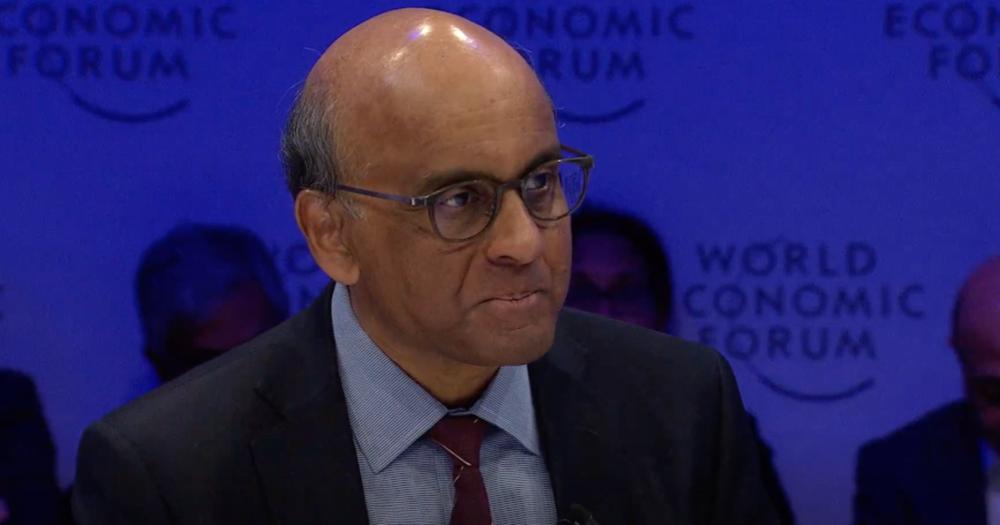Follow us on Telegram for the latest updates: https://t.me/mothershipsg
At a World Economic Forum (WEF) panel session on Thursday (Jan. 19) titled “Is Rapid Growth still Possible?”, Senior Minister Tharman Shanmugaratnam said that the current trajectory of the economic relationship between China and the U.S. would become a “negative sum situation”, not just a zero-sum one.
Tharman described the current world as “a world of shocks” with pandemics “baked” into the system, noting that the prioritisation of fiscal policy would require some thinking.
“What is the role of fiscal policy? Just go back to basics now, in a world of shocks where we need to invest, to anticipate and prevent, and how much buffer do you need in normal times, because crises will happen?”
He also said that one should be more than a firefighter as being one “implies you just wait for crises to happen”, pandemics or extreme weather could happen again and more frequently in the current world.
Economic interdependence and national security
When asked by the Governor of the Bank of Japan (BOJ) Haruhiko Kuroda on his view of the future of U.S.-China economic relationship, Tharman highlighted economic interdependence and national security considerations.
“I think on the current trajectory of that relationship, particularly with regard to the types of restrictions on economic interdependence, and the scale of those restrictions, we're going to end up with not just a zero-sum situation but a negative sum situation.”
He said that if the current trajectory continues, national entities in the U.S. and China, as well as their workforce and people, would be hurt.
“I think a way will have to be found where legitimate national security considerations, given that technology now plays a different role in military capabilities, those considerations can be met in a very confined way without undermining another national security consideration, which is that interdependence creates a more secure world.”
“Now, do we want those two largest economies and superpowers to be at fundamental odds with each other? Or do we want them to be able to cooperate where it really matters in their national interests and the global interest, and then to negotiate over thorny issues and to be very tough with each other?”
Tharman then said that it is ultimately a fundamental question of national security, not just one of economic prosperity.
“Lewisian” model of economics
Tharman also answered a question on whether to be optimistic about technology’s impact on economic development and growth.
He said that it is about the deployment of labour and citizens in an economy.
He referenced the economic concept of Lewis Turning Point, which happens when a nation runs out of surplus labour, leading to higher wages, consumption and inflation rates.
Tharman said that in many parts of the world, the workforce has now been “deployed in more urban and semi-urban settings in manufacturing and modern services.”
“And then the real question, therefore, is, how do you grow through productivity growth within sectors, not just by allocating labour differently across sectors? How do you grow productivity within sectors?
He also made reference to the words of Lawrence Summers, a fellow panelist and former Secretary of the Treasury of the U.S., on the issue of increasing productivity while doing it “in a way that also creates jobs across the spectrum of your citizenry”.
Tharman said that it is a challenge now, as there is also a displacement of labour from productive industries.
“And the whole issue of distributing jobs around an economy that matches the way in which value is being created in manufacturing and services is now a whole new policy issue.”
Go Green
When an audience member asked which single area each of the panelists would allocate their fiscal resources, Tharman said he would invest in green infrastructure.
“So I think if you look at the green transition, energy transition, and also the greening of entire economies, it's often viewed as a burden and a cost. You pay the cost now and eventually, you avoid a much larger cost down the road. It's actually a huge opportunity for growth...
If we can deploy our energies nationally and collectively to investing in green infrastructure, it has a huge fillip to grow with for a long time. But importantly, it also allows for different distribution of rewards.”
This is Tharman’s second panel in the WEF that comes after a previous session titled "Banking in the Eye of the Storm", in which he spoke about the importance of regulation and being clear on the risks in financial markets.
Davos 2023
Tharman was one of the three ministers representing Singapore at the WEF held in Davos, Switzerland.
The other ministers are Minister for Communications and Information Josephine Teo and Minister for National Development Desmond Lee.
Stories you might be interested in:
Top image via World Economic Forum
If you like what you read, follow us on Facebook, Instagram, Twitter and Telegram to get the latest updates.
